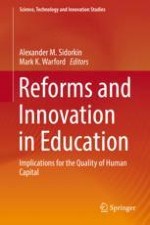2017 | OriginalPaper | Chapter
7. Understanding Technology Integration Failures in Education: The Need for Zero-Order Barriers
Authors : Ilias Karasavvidis, Vassilis Kollias
Published in: Reforms and Innovation in Education
Publisher: Springer International Publishing
Activate our intelligent search to find suitable subject content or patents.
Select sections of text to find matching patents with Artificial Intelligence. powered by
Select sections of text to find additional relevant content using AI-assisted search. powered by
